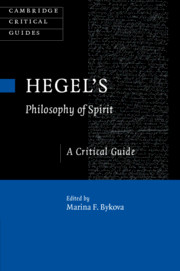Book contents
- Hegel’s Philosophy of Spirit
- Cambridge Critical Guides
- Hegel’s Philosophy of Spirit
- Copyright page
- Contents
- Contributors
- Acknowledgments
- Abbreviations
- Introduction
- Part I Philosophy of Spirit and Hegel’s Philosophical System
- Part II Philosophy of Subjective Spirit
- Chapter 3 Hegel’s Critique of Theoretical Spirit
- Chapter 4 Derangements of the Soul
- Chapter 5 Hegel’s Account of Perceptual Experience in His Philosophy of Subjective Spirit
- Part III Philosophy of Objective Spirit
- Part IV Philosophy of Absolute Spirit
- Bibliography
- Index
- Cambridge Critical Guides
Chapter 4 - Derangements of the Soul
from Part II - Philosophy of Subjective Spirit
Published online by Cambridge University Press: 24 June 2019
- Hegel’s Philosophy of Spirit
- Cambridge Critical Guides
- Hegel’s Philosophy of Spirit
- Copyright page
- Contents
- Contributors
- Acknowledgments
- Abbreviations
- Introduction
- Part I Philosophy of Spirit and Hegel’s Philosophical System
- Part II Philosophy of Subjective Spirit
- Chapter 3 Hegel’s Critique of Theoretical Spirit
- Chapter 4 Derangements of the Soul
- Chapter 5 Hegel’s Account of Perceptual Experience in His Philosophy of Subjective Spirit
- Part III Philosophy of Objective Spirit
- Part IV Philosophy of Absolute Spirit
- Bibliography
- Index
- Cambridge Critical Guides
Summary
In Moby-Dick; or, the Whale (1851), Herman Melville writes that “there is no folly of the beasts of the earth which is not infinitely outdone by the madness of man.” Hegel gives a sophisticated explanation of this fact, namely, that proper madness (der Wahn) is a peculiarly human condition. This argument is developed in the context of the Anthropology’s broader theory of the feeling soul (Die fühlende Seele: §§403–10).1 This prominently includes an explanation of the endogenous transformation of the sentient organism into bodily self-awareness, a change which Hegel calls the “awakening” of the sentient soul (die empfindende Seele) to the feeling of self (Selbstgefühl: §407).2 The active condition of an individual capable of feeling – no longer capable only of sentience3 – implies the capacity for self-feeling. This is because the very activity of feeling consists of a permanent leading back of sensations (impressions, affections) toward a center.
- Type
- Chapter
- Information
- Hegel's Philosophy of SpiritA Critical Guide, pp. 83 - 103Publisher: Cambridge University PressPrint publication year: 2019
- 2
- Cited by

